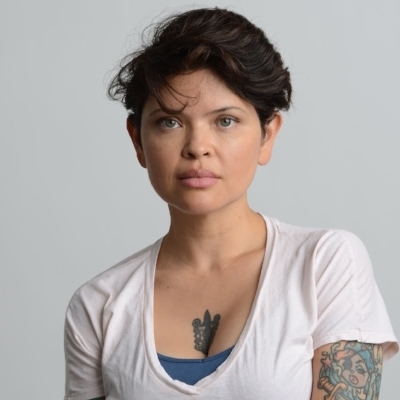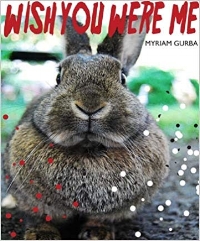By Amy Lutz, MCWC Executive Assistant
At MCWC, our mission is to amplify and celebrate vibrant, diverse voices whose work speaks to the remarkable spectrum of human experience. This year, in addition to our non-fiction and memoir workshops, the Master Class will focus on memoir and personal essay writing as well. We are thrilled to announce that the MCWC 2019 Master Class will be taught by Myriam Gurba.
Myriam is a writer, a spoken-word artist, and a visual artist. She has written for Time, KCET, and The Rumpus, among others. Her debut book, Dahlia Season: Stories and a Novella, won The Edmund White Award for Debut Fiction, and was a finalist for a Lambda Literary Award. Her collection of short stories, Painting Their Portraits in Winter, explores Mexican stories and traditions through a feminist lens. Her latest book, Mean, is part memoir, part true-crime and combines humor and honesty to describe Myriam’s coming-of-age as a queer, mixed-race Chicana in Santa Maria, California. Mean was a finalist for the Lambda Literary Award in LGBTQ Nonfiction and a finalist for the Publishing Triangle Judy Grahn Award for Lesbian Nonfiction.
Myriam shared with us a little about her writing process and her plans for MCWC 2019’s Master Class in Memoir.
Mean combines poetry and prose, breaking from a conventional narrative structure. The New York Times called it a memoir, your publisher, Coffee House Press, called it a nonfiction novel, The Rumpus called it a “series of vignettes,” and Pacific Standard called it “radically experimental,” and an “unconventional coming of age.” How would you describe your book? In your writing process, was the play with form and language natural or did it come through intentional revision?
I might call it an experimental true crime book. Sexual assault is a crime but I wasn’t interested in writing about sexual assault according to the literary and paperback scripts that I’d consumed, so I set out to write about such crimes weirdly. I’m fine with all the other things the book has been called. There’s truth in all those names. The play with form and language is both natural and comes through intentional revision. I knew that if I wanted to write about sexual assault and PTSD, a linear format wasn’t going to make sense because PTSD disrupts the linear. So from the get-go I knew I was going to have screw with structure. I knew that structure, or the seeming lack thereof, was going to have to jar the reader. If sexual assault fucked me up, it had to fuck up my reader too and not just emotionally but also through perceptions, and misperceptions, of time and space.
Before Mean, you published fiction and short story collections, including Painting Their Portraits in Winter, Dahlia Season: Stories and a Novella, Wish You Were Me, and more. How did you come to switch to non-fiction? Was there a difference in your writing process for creating Mean, compared to your previous works?
There wasn’t a switch for me. I was writing nonfiction when those fiction collections were published but my nonfiction didn’t interest anyone so it collected dust, fur, dandruff, and cobwebs. Sometimes, I bump up against a dumb moral concern when I write fiction where I feel like a “liar.” LOL. And then I feel bad for lying and then I have to remind myself that that’s the point. Maybe that’s because I was raised Catholic.
Writing Mean was different from a lot of writing I’ve done because I was scared to write some parts of it and I’ve never been scared to write anything before. I’ve never avoided writing about something or written around it before, and there were some parts of Mean where I did that. Fear made me procrastinate. Also, there were times when I was writing during which I broke down crying, sobbing over events and horrors that I’ve never let myself cry about “in real life.” I got to cry about them when I wrote about them. I got to feel through those events by writing about them and I did so in a way that I couldn’t when I was living through them. It was kind of like visiting a grave, a tomb, an altar, and feeling safe enough and private enough to cry now. That’s not to say that writing Mean was healing. It wasn’t. My dad doesn’t seem healed when he visits his father’s grave.
In Mean, you don’t shy away from painful territory, including rape and sexual violence, systemic and internalized oppression, and anti-Mexican racism. You treat these themes with humor and blunt honesty. What was the publishing process like for you with this book? Do you have any advice for writers tackling issues of race, gender, oppression or sexual violence in their work?
I self-published part of Mean as a zine called A White Girl Named Shaquanda. I sold the zine and gave it away too. AWGNS mostly focused on my junior high experiences which then became the first third of Mean. The publishing process wasn’t front door. I didn’t walk in
through the publishing world’s front door. I climbed in through the bathroom window with a boost from feminist friends. Emily Gould asked me to submit a manuscript to her imprint at Coffee House Press and that was how Mean happened.
To people who are writing about race, gender, oppression, and sexual violence I’d say, read how other people are writing about those things. Then don’t write like those people. Write differently. Also, humor is okay. Even if you’re writing about rape. Who needs a good laugh more than a rape victim? I mean, maybe a murder victim, but that’s what heaven and hell are for. Hell sounds like so much fun sometimes.
You are a full-time high school teacher. In this interview in Truthout, you mentioned teaching high school requires the ability to hear tough stories. Teaching memoir and personal essay writing probably requires the same skill! What can participants expect from your workshop?
Participants can expect me to be loud and to talk too fast. I will probably encourage some participants to not fall in love with their own work and I will rail against clichés, most likely while using clichés. I hope, though, that we’ll have fun, because fun matters. Once we start to have too much fun, I’ll revert to rigorous bitch.
Books like Mean have been important pieces of the larger national conversations about sexual violence, #MeToo, and issues relating to race and gender. In what ways would you hope to see writing continue to influence these conversations? What do you hope writers will take away from your workshop about creating art in the current cultural climate?
I hope to read more and more and more by women. I hope women are given more and more and more platforms. And I hope for that not only in the writing world but the world, period. Women are still “the second sex,” we’re not equal, patriarchy is a thing, a legitimate thing that suppresses women’s potential to be the kick ass people we are capable of being. The real reason so many men are scared right now isn’t because they’re afraid of being “falsely accused” of “sexual misconduct.” I HATE THAT EUPHEMISM. What they’re afraid of losing is their masculine birthright. They’re being told that the world is NOT their oyster and that it never was and that our oysters are NOT their oysters.
I want to read women’s accounts of how sexual abuse and violence aren’t isolated and limited to one or a few episodes in our lives. Most women experience such abuse and violence across our lifespans, it’s like that dumb movie Groundhog Day, and the story of enduring it over and over and over and over is one that needs to be told and told and told so that the scope of the endurance-based sport I call “being a woman” is more truthfully communicated and not waxed and plucked for masculine consumption. I hope that writers who participate in my workshop not only leave understanding that the personal is political but, more importantly, that the personal is politiclol.
What do you like to do when you’re not teaching or writing?
When not teaching or writing, I like to have my back scratched, my feet rubbed, and to be given money.
The Master Class with Myriam Gurba is a juried-in workshop, restricted to only twelve participants. Applications will open January 1 and close February 15. Please visit mcwc.org after January 1 to apply.
Keep an eye out here for more introductions to MCWC 2019 faculty. To make sure you don’t miss an announcement, subscribe to our newsletter!





